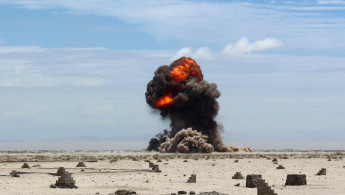Suicide bomber kills five soldiers in south Yemen
Another seven soldiers were wounded in the attack targeting troops who had been sent from the main southern city of Aden to Lahj province to fight extremists.
A military official said it was unclear whether the attack had been carried out by al-Qaeda or the Islamic State group, both of which have gained ground in the south and claimed deadly anti-government assaults in the past.
The bombing came hours after clashes between troops and extremists in Lahj, the military officials told AFP, adding that Saudi-led coalition jets also took part in the fighting.
Also on Sunday, suspected members of al-Qaeda shot dead an army colonel in nearby Abyan province.
The gunmen on a motorbike opened fire at Colonel Abdullah Shamba, killing him immediately before driving off, an official said.
Shamba headed a local anti-al-Qaeda militia in Abyan.
Late on Saturday, coalition jets attacked al-Qaeda positions in Abyan's provincial capital of Zinjibar and in the nearby town of Jaar.
Government forces backed by the Arab coalition began an all-out offensive in March against extremists in south Yemen, recapturing main cities they had held.
But they later retreated from Zinjibar after al-Qaeda militants struck back.
Militants have exploited the power vacuum created by the conflict between the government and Houthi rebels and their allies to expand their presence in south and southeast Yemen.
The Arab coalition which backs the Yemeni government against the Houthi rebels has also turned its sights on the extremists, and the United States has pressed its drone war against them.
Washington considers the Yemen-based al-Qaeda in the Arabian Peninsula, or AQAP, to be the extremist network's deadliest franchise.





 Follow the Middle East's top stories in English at The New Arab on Google News
Follow the Middle East's top stories in English at The New Arab on Google News
![Israeli forces ordered bombed Gaza's Jabalia, ordering residents to leave [Getty]](/sites/default/files/styles/image_330x185/public/2176418030.jpeg?h=a5f2f23a&itok=_YGZaP1z)

